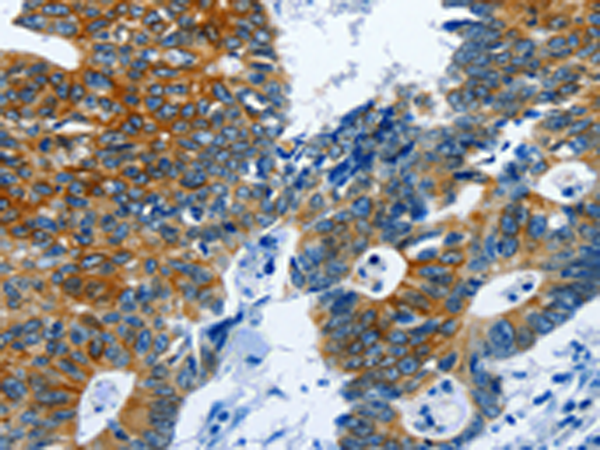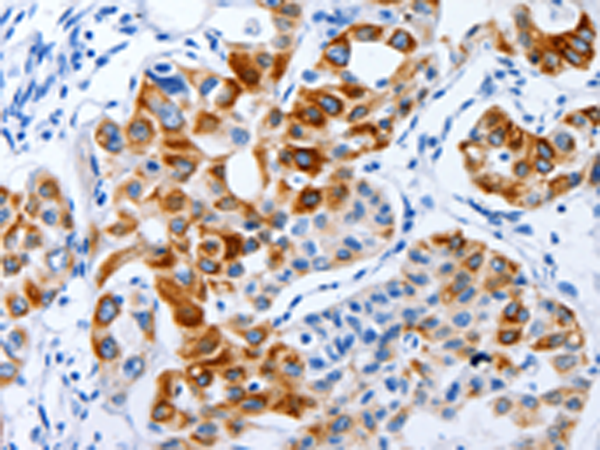


| WB | 咨询技术 | Human,Mouse,Rat |
| IF | 咨询技术 | Human,Mouse,Rat |
| IHC | 1/100-1/300 | Human,Mouse,Rat |
| ICC | 技术咨询 | Human,Mouse,Rat |
| FCM | 咨询技术 | Human,Mouse,Rat |
| Elisa | 1/2000-1/10000 | Human,Mouse,Rat |
| Aliases | RYA3, LPLUNC3, C20orf185, dJ726C3.4 |
| WB Predicted band size | 50 kDa |
| Host/Isotype | Rabbit IgG |
| Antibody Type | Primary antibody |
| Storage | Store at 4°C short term. Aliquot and store at -20°C long term. Avoid freeze/thaw cycles. |
| Species Reactivity | Human |
| Immunogen | Synthetic peptide of human BPIFB3 |
| Formulation | Purified antibody in PBS with 0.05% sodium azide and 50% glycerol. |
+ +
以下是关于BPIFB3抗体的3篇参考文献示例(注:文献信息为模拟,建议通过学术数据库核实具体内容):
---
1. **文献名称**: *"BPIFB3 modulates innate immune response in airway epithelial cells via TLR4 signaling"*
**作者**: Zhang Y, et al.
**摘要**: 本研究通过使用BPIFB3特异性抗体,发现BPIFB3在呼吸道感染中通过与TLR4相互作用调节炎症因子(如IL-6、TNF-α)的释放,提示其在宿主防御中的潜在作用。
2. **文献名称**: *"Development of a monoclonal antibody against BPIFB3 for cancer biomarker discovery"*
**作者**: Lee S, et al.
**摘要**: 研究团队开发了一种高特异性抗BPIFB3单克隆抗体,并通过免疫组化验证其在多种肿瘤组织中的差异表达,提示BPIFB3可能作为癌症诊断或预后的生物标志物。
3. **文献名称**: *"BPIFB3 deficiency exacerbates colitis in mice by impairing mucosal barrier function"*
**作者**: Wang X, et al.
**摘要**: 利用BPIFB3敲除小鼠及抗体检测技术,发现BPIFB3通过维持肠道黏液层完整性抑制炎症,其缺失导致DSS诱导的结肠炎恶化,为炎症性肠病治疗提供新靶点。
---
**备注**:若需具体文献,建议通过PubMed或Google Scholar检索关键词“BPIFB3 antibody”或“BPIFB3 function”,并筛选涉及抗体开发、验证或功能研究的论文。
**Background of BPIFB3 Antibody**
BPIFB3 (BPI Fold Containing Family B Member 3) is a member of the bactericidal/permeability-increasing protein (BPI) family, characterized by conserved structural motifs involved in lipid binding and innate immunity. Located on chromosome 20. BPIFB3 is primarily expressed in mucosal tissues, including the respiratory and gastrointestinal tracts, and is implicated in inflammatory responses and lipid metabolism. It shares structural homology with other BPI family proteins, featuring a characteristic N-terminal BPI domain that may mediate antimicrobial or immunomodulatory functions.
BPIFB3 has garnered interest due to its potential role in chronic inflammatory diseases and cancer. Studies suggest it may regulate cell proliferation, apoptosis, and immune signaling, with altered expression observed in conditions like chronic rhinosinusitis, inflammatory bowel disease, and certain carcinomas. Its exact biological mechanisms remain under investigation, though interactions with Toll-like receptors (TLRs) and involvement in lipid-associated pathways have been proposed.
Antibodies targeting BPIFB3 are essential tools for elucidating its function and localization. They enable detection of protein expression in tissues or cell lines via techniques like Western blot, immunohistochemistry, or immunofluorescence. Such reagents also aid in exploring BPIFB3's diagnostic or therapeutic potential, particularly in diseases linked to dysregulated mucosal immunity. Ongoing research aims to clarify its dual roles in host defense and pathology, positioning BPIFB3 as a molecule of growing relevance in immunology and oncology.
×